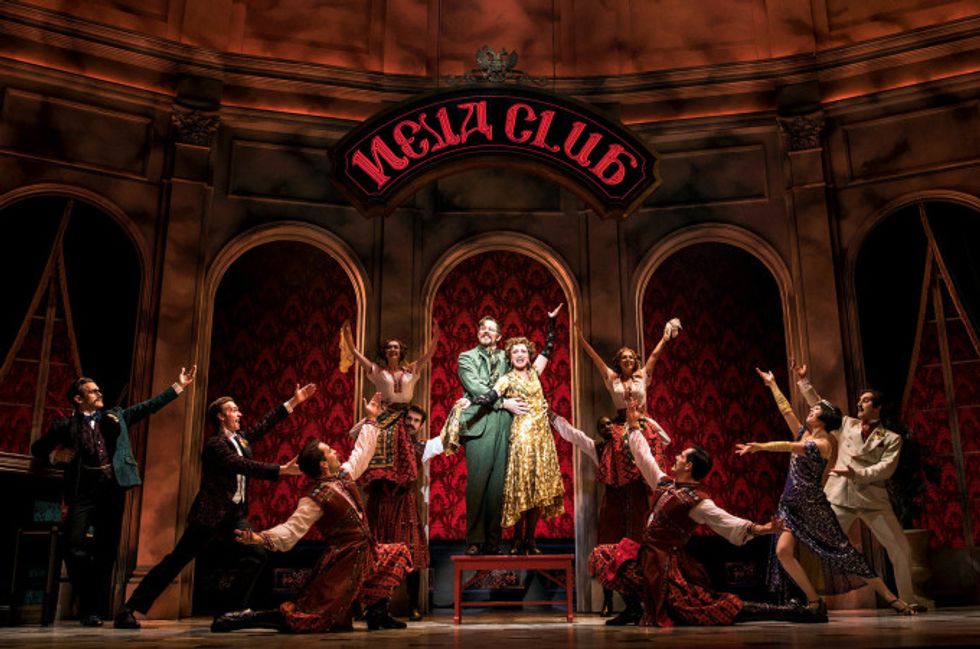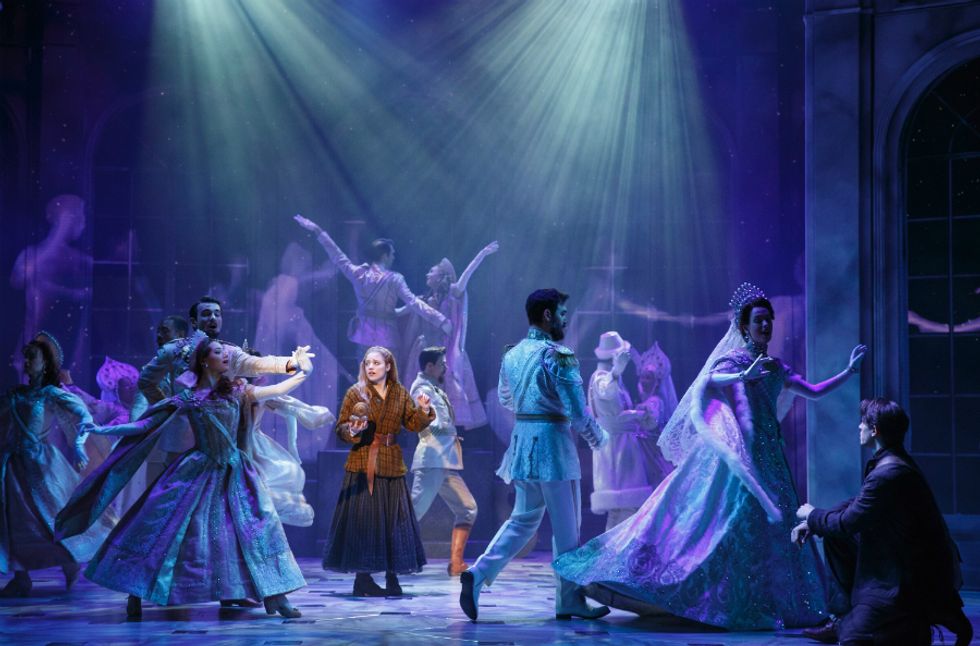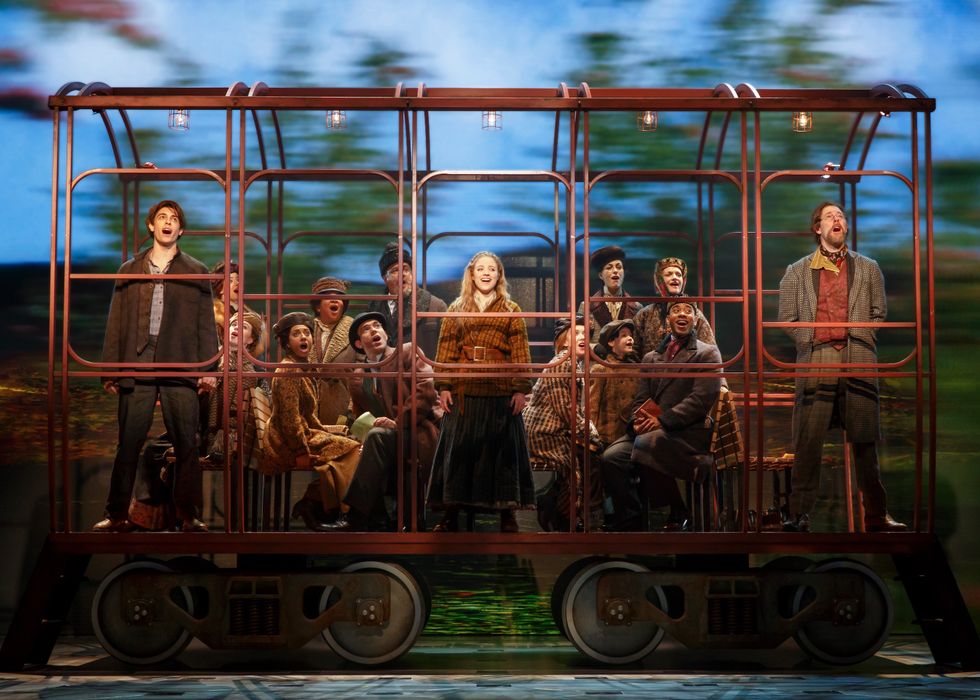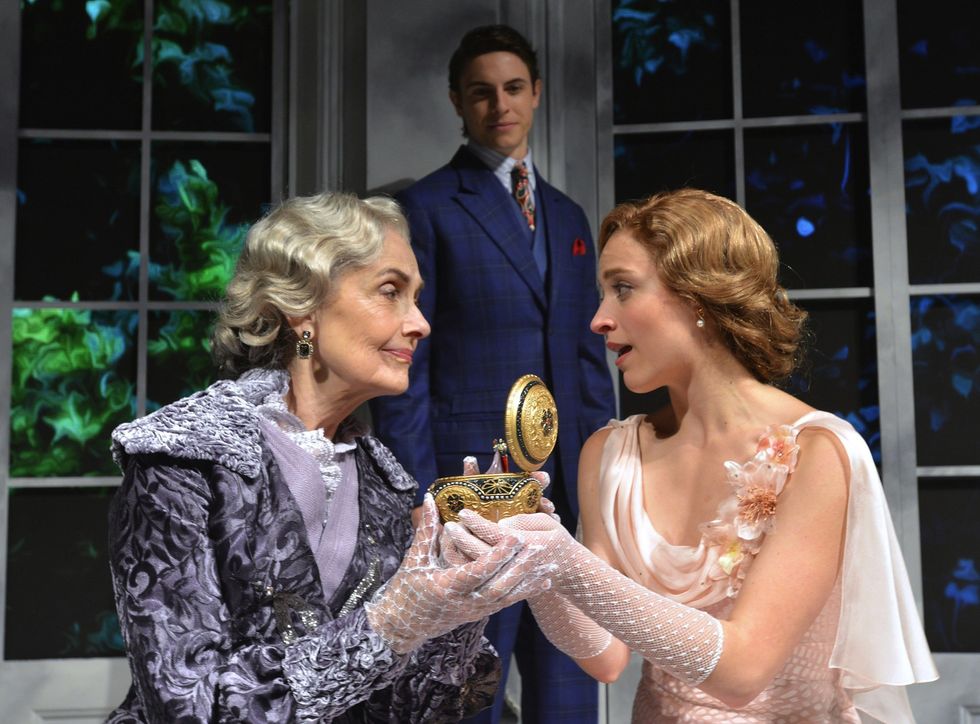The new Broadway musical Anastasia has had a long journey to Broadway. Lynn Ahrens and Stephen Flaherty wrote the songs for the movie on which it's based, and they, along with Terrence McNally, brought the story to life again, starting with a reading in 2012, a workshop in 2015, and a premiere in Connecticut last year before finally gracing Broadway with its royal presence in March of this year.
This is not the Don Bluth film from your childhood. When purchasing the tickets, I noticed a disclaimer stating that children under a certain age weren’t permitted in the theatre. This struck me as odd, considering the musical is based on a children’s movie, one I watched repeatedly when I was definitely below that certain age. However, not long after the show begins, it’s easy to see why.
In an effort to move away from the cartoon that inspired the musical, the writers and producers went back to the roots of both stories: the urban legend of the Grand Duchess Anastasia, the youngest daughter of the last Russian czar, who allegedly escaped the massacre that killed her entire family.
The 1997 movie spun a fairytale of Disney proportions: young Anya suffered memory loss after being separated from her family as they tried to escape the siege of the palace, and after aging out of an orphanage, finds herself traveling to Paris with the help of con man Dimitri and former royal Vlad, both of whom are looking to make a fortune by passing her off as the Grand Duchess to her grandmother.
That concept is still the same—Anya, Dimitri, and Vlad still get to Paris—but the musical offers a different perspective, one more rooted in history than fantasy.
Instead of the main villain being Rasputin (who was actually a real person, though he didn’t have the supernatural powers the movie granted him…allegedly), the musical nixed his character entirely.
Instead, they delve into the politics of the Russian Revolution, and Ramin Karimloo (used to sulking in the shadows, since he played the Phantom in both The Phantom of the Opera and Love Never Dies) takes on the role of Gleb, a communist officer who takes a liking to Anya, until he discovers her true identity.
St. Petersburg is referred to as Leningrad (which it historically was, during that time), and the massacre of the Romanovs is frequently described, often stopping just short of gory details. The siege on the palace is actually shown on stage; fire roars in the background, glass shatters, and the family rushes to get out and stay together.
It’s a terrifying moment, and I teared up, just knowing that all these people (Anastasia’s parents, sisters, and brother were all on stage) were unable to escape their death.
There were also nods throughout the show to actual historical facts. In the beginning, Anastasia’s mother Catherine scolds Marie (Anastasia’s grandmother) for giving her the iconic music box. “Better prayers than music boxes in times like these,” she says, alluding to the unstable Russian empire and the clashes over religion.
Later, Catherine visibly panics at the sight of the youngest child and only son, Alexei, dancing with his sisters. He falls, and everyone freezes. In real life, Alexei was a hemophiliac; he was often kept away from activities that might get him injured.
Additionally, towards the end of Act One, Anya reveals to Dmitry and Vlad that she had a diamond that a nurse found sewn into her underclothes. When they went into exile, the royal family sewed their jewels to their clothing.
Anya also references her dog, Jimmy; in recalling a vague memory, she tells Dmitry that she held her puppy as the soldiers led them away, and she “felt his little heart beating” and told him “they’re good people, they won’t hurt us.”
In Act Two, Anastasia has a nightmare, visualizing her family at the last ball they held, and Alexei says, “Can I tell you a secret? I’m going to die soon. We all are.” Finally, when Gleb confronts Anastasia at the end of the show, she says that if he kills her, she “will be with my parents and my brother and sisters in that cellar in Yekaterinburg all over again!”
Definitely not for the younger set, but it was touches like these that I loved. Another great historical bit also came in the final confrontation scene:
Gleb: If you are Anastasia, do you think history wants you to have lived?
Anya: Yes! Why don’t you?
Gleb: The Romanovs were given everything and gave back nothing—until the Russian people rose up and destroyed them!
Gleb isn't wrong--things weren't always good in Russian under the royal family (except for the upper class, something explored in the number "The Land of Yesterday" and its reprise). I wish they had done more with the theme of this exchange; I found myself hoping that Anya would follow it up with “We can do it differently, we can be better."
All the original songs are kept (with the exception of Rasputin’s song, but they do use the melody elsewhere) though the context and lyrics are changed in places. “Rumor in St. Petersburg” is altered to reflect the dark times after the revolution: “the walls have ears, and he who argues disappears!”
The set and costumes were mind-blowing. Every ballgown and dress shimmered constantly; from Czarina Catherine’s glittering crown and dress to Anya’s iconic blue gown, every outfit was absolute perfection. I can’t imagine how much work went in to creating these outfits. They’re works of art in and of themselves.
My personal favorites were Anya’s final red gown, the trio’s outfits when they first arrive in Paris, and every costume in the “Land of Yesterday” scene, which has Lily commiserating with her fellow Russian émigrés in a nightclub that reminds them of a time when they were all on the top rung of society.
The set is dazzling; I'm still not over it. There's a set of windows on either side of the stage, and the images in them reflect the background. When the Vlad, Dmitry, and Anya are in Paris, there's cherry blossoms; in the opening scene, snow falls; and during the siege of the palace, there is a raging fire and men's silhouettes.
The windows are also utilized in "Close The Door" and "Everything To Win (Reprise);" the former has the Dowager Empress mourning her family, and the actress who plays Anastasia as a child lingers just behind her, through the windows, though Marie never turns to see her.
In "Everything To Win (Reprise)," Anastasia is ruminating on her feels for Dmitry, and doesn't see Gleb slink in and lock them both in the room (Gleb hangs out around the windows during "The Land of Yesterday (Reprise)" as well.).
During the final confrontation where Gleb holds Anya at gunpoint, we see her family slowly backing away from soldiers just behind the windows. The backdrop between the sets of windows also changes, using digital images to make the changes go more smoothly.
During the "Once Upon A December" sequence, Anya stands amid her family and friends as they dance elegantly around her, shadowed in ghostly light; images of the dancers are also projected onto the walls of the theatre, letting the audience be in the middle of Anya's memory.
Pictures are taken of the Romanov family and of the Dowager with her granddaughter towards the end of the play; the characters face different angles, pause, and then a flash and click go off, as if the audience is taking the pictures themselves.
During Anya, Dmitry, and Vlad's train ride to Paris, a train car sits and spins on stage, and we can see the trio and the other travelers. The background mimics a landscape flying by, and the train turns to focus on different characters.
At the end of the "Journey To The Past" sequence, the background quickly moves to an image of Paris as seen from above, as if Anya had just run up a hilltop to see it. This is a nod to the placement of the song in the original film, when Anya decides to go to St. Petersburg. The clever staging was definitely one of the highlights of the show.
The cast is superb; Christy Altomare has the voice and face of an angel, and she carries herself with extraordinary grace. There’s no doubt that her Anya is royalty.
Derek Klena’s Dmitry is less of a “con man with a heart of gold” and more of a lovable rogue, just a guy down on his luck. Klena’s voice is incredible; the song “My Petersburg” is my favorite of the new songs (the way he sings the line “palaces above and alleyways below” gives me goosebumps).
Caroline O’Connor, who plays Countess Lily (Sophie in the film), is also absolutely fantastic. She and John Bolton (Vlad) have incredible chemistry and comedic timing together. Additionally, Sophie was voiced by Bernadette Peters in the film; O’Connor's looks and mannerisms reminded me strongly of her. Mary Beth Peil was absolutely stunning as the Dowager Empress, Anastasia’s grandmother.
After we see all the Romanovs disappear, she appears on stage, reading a letter. She whispers, “All of them?” in disbelief, and then again, “All of them?” in a heartbreaking voice. Just those three words had me in tears. She did it again, later, with her song “Close The Door,” which I can’t even listen to now without crying: “And where does summer go? I will never know, summer used to go on endlessly. Children all in white, running down the sand, to me…to me.”
The song is about the Dowager being emotionally exhausted from hearing about so many imposters claiming to be her beloved granddaughter.
Gleb can’t decide if Anya is a frightened young girl or a diabolical temptress; the song “Still” is all about his internal conflict over his affection towards her and his orders to kill her, the way his father participated in the murders of her parents and siblings.
During the ballet quartet in Act Two (which is originally Cinderella, but is now changed to Swan Lake, in keeping with the overall theme) Gleb and Dmitry sing parts of “Once Upon a December,” altered to reflect how they feel about Anya: “Someone holds her safe and warm/someone rescues her from the storm.” Simultaneously, Swan Lake plays out: Siegfried and Rothbart fight over Odette, a pure white swan.
I do wish they had kept more of Anya’s fiery personality. Christy Altomare does an amazing job with this role, but I miss the heroine who had a sassy quip for every occasion and proclaimed, after accidentally punching Dimitri, “Men are such babies!”
Also, this gem: “Do you really think I’m royalty?…Then stop bossing me around!” This Anya is tough, don’t get me wrong (she takes out a group of thugs by herself, and strength isn’t always physical), but I missed the attitude that I had come to associate with the character.
I wish Anya and Dimitri’s rapport was more prominent in the musical, as it makes them falling in love and eloping more believable. While their past connection was not as definitive here (in the movie, Dimitri rescues her from the palace, and when Anya recounts the story, Dimitri knows she’s really Anastasia), it did add on to Dmitry’s character; the pair briefly met at a parade, and Anya knew that he had bowed to her without him having to say it.
Dmitry previously said that he had only bowed to someone once, and had regretted it; when they both realize the truth about Anya’s identity, he bows to her again. Additionally, Dmitry lets it slip in an early scene that his childhood nickname was Dimka, and in the final scene, when Anya finds him again, she says "I choose you, Dimka." They're both poignant moments that mirror each other, and I loved it.
Anya’s tenuous connection to Paris felt flimsy; here, she only has a vague sense of needing to go there, while in the movie, she has a necklace with the words “together in Paris” engraved on it. This necklace is also the key to the music box, a central object in both versions. Here, Anya opens it without any explanation, while everyone else who tried (Dmitry, for example) could not.
I wish this show could gone through one more round of editing. It’s a beautiful, nearly flawless show, but it has many subplots that could have been more streamlined. But, I’m not going to lie; I was grinning with excitement every time the lights went down, and I was sobbing during curtain call. It's a musical for adults who loved the movie in childhood, but had to learn the truth behind the fairytale.
The urban legend of Anastasia’s survival (despite being ultimately disproved a few year ago, though the ending of the musical leaves room for the mystery to continue) reflects our collective need to hold on to hope, and this beautiful show sees that.




























